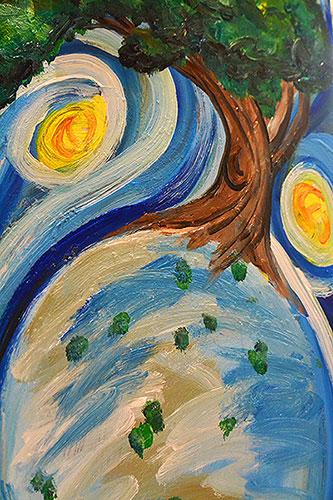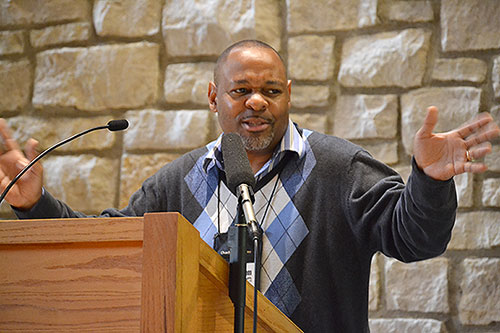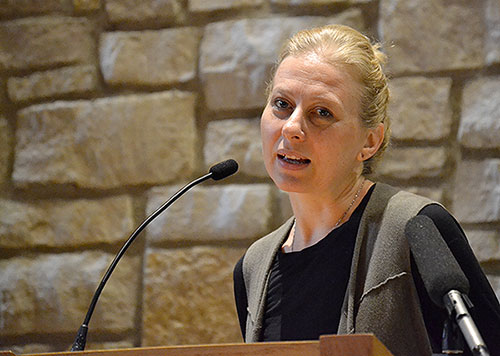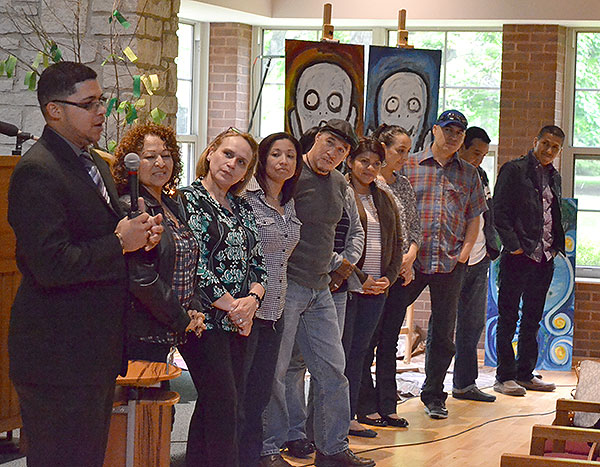
A painting by Dave Weiss, created during the new church planting conference in May 2016, illustrates the twin themes of hope and imagination.
“Hope, Imagination, Mission”–the theme of the Church of the Brethren new church planting conference May 19-21 in Richmond, Ind., hosted by Bethany Theological Seminary–prompted a new call to the whole church to develop its imagination and foster a new hope in the gospel of Jesus Christ. Some 100 people participated in worship, keynote presentations, workshops, and a special training track in Spanish. The conference was sponsored by Congregational Life Ministries.
Keynote speakers Efrem Smith and Mandy Smith (no relation) emphasized the power of developing a holy imagination, and the way it leads to an increase in hope and therefore in discipleship. Efrem Smith is president and CEO of World Impact, an inner-city missions organization dedicated to planting churches among the unchurched, urban poor in the United States. Mandy Smith, originally from Australia, is lead pastor of University Christian Church, a campus and neighborhood congregation in Cincinnati, Ohio.
A touchstone scripture for the conference came from Revelation 7:9, which also is a key text for the intercultural movement in the Church of the Brethren: “After this I looked, and there was a great multitude that no one could count, from every nation, from all tribes and peoples and languages, standing before the throne and before the Lamb, robed in white, with palm branches in their hands.”
Empowered to be the church everywhere

Efrem Smith.
Efrem Smith challenged the gathering to stir their imaginations to ask, “Who are we to be as the church?” Referring to Revelation 7:9, and to the current national conversation about race, he answered with more questions: “What does it mean for the church to be a force for reconciliation? …What does it mean to be the church robed in Christ, reconciled in Christ? …To be reconciled to each other across class, across race? …To bear one another’s burdens in Christ Jesus?”
For the church to sustain hope and develop a godly imagination in an upside-down world, Efrem Smith said that worship is the imperative. “Sustain the worship!” he urged. “It is an identifying mark on the church. …I don’t care how dark the hour, the church must sustain its praise!” How does the church do that? He answered: “Through knowing how empowered we are…. We must lean into the invisible spiritual forces that God surrounds us [with]. They empower us, right now…. We are not alone.”
His advice to church planters was direct and specific: “God sees those who are in trouble…. We know there is triumph on the other side of tribulation…. We should look for the people who are in tribulation and great trouble and bring the church to them.” Likening the church to “a bridge over troubled waters,” he continued: “We need to plant churches everywhere. I’m not just talking about the inner city, there are rural areas and small towns that need the church now more than ever.”
Finding hope despite the challenges

Mandy Smith
Mandy Smith focused the meeting’s attention on the question of how to find hope amid the struggles and challenges faced by church leaders, and church planters in particular. She told her own personal story of discovering the truth of the Apostle Paul’s teaching, that God’s power is made known in our human weakness. In moments of failure, she told the group, she has heard God’s voice telling her: “In your weakness, I am strong.”
“Can we have bad days sometimes?” she asked, noting that the promise of God is not an excuse to be lazy or not work our hardest, but a help for the moments of despair when life seems to be beyond our control. “Can we show weakness sometimes? …Can I cry, and still have people respect me? …Can I show joy?”
Using the symbol of emptiness as a sign of God’s presence, she encouraged the conference, “If only we let our emptiness be seen…. As human beings let themselves be human, God can be seen to be God.”
Characterizing weakness as a “limitless ministry resource,” she said that the best Christian ministry grows from a reliance on God. Our culture holds up perfection as the ideal, denying the reality that humanness is brokenness. Instead of trying to live up to some impossible standard that does not exist in reality, she called church leaders and church planters to have the faith to trust that God is found in dark places, through confession of our imperfections, and in weakness.
“How do you delight in these things that seem to disqualify?” she asked. “Invite God to redeem your imagination in how he delights.”
Mandy Smith prayed for the gathering: “We ask, God, that you would heal our hope…that nothing limits you.”
Worship, workshops, and stories shared

A group of students in the Spanish-language ministry training track of the Brethren Academy for Ministerial Leaderhship, SeBAH-CoB, share with the conference.
The conference also featured worship, numerous workshops, a panel discussion responding to the themes, and a time for story sharing by people involved in brand new church plants as well as those celebrating the success of church plants that are maturing into established congregations.
Special guests were Rachel and Jinatu Wamdeo, former general secretary of Ekklesiyar Yan’uwa a Nigeria (EYN, the Church of the Brethren in Nigeria). He gave a short presentation on the current situation of EYN, and shared the gratitude of the Nigerian Brethren for the assistance received from American Brethren. “The Church of the Brethren and EYN is one,” he said. “We are not Church of the Brethren in Nigeria and you are not Church of the Brethren in America, we are one church in Jesus Christ. Thank you, thank you, thank you.”
An intercultural dinner gathering featured a presentation reviewing ways slavery and racism historically have divided the Christian church in the United States. The event was hosted by Gimbiya Kettering, director of Intercultural Ministries. The presentation was given by Yakubu Bakfwash, originally from Nigeria, who serves with the Center for Nonviolence and Conflict Transformation and is connected with Rockford (Ill.) Church of the Brethren. His presentation relied on the book written by Michael O. Emerson and Christian Smith, “Divided by Faith: Evangelical Religion and the Problem of Race in America” (2000, Oxford University Press). The book is available to order through Brethren Press, go to www.brethrenpress.com/ProductDetails.asp?ProductCode=1343 .
A photo album from the conference is online at www.bluemelon.com/churchofthebrethren/2016newchurchplantingconference . For more about the church planting movement in the Church of the Brethren, go to www.brethren.org/churchplanting